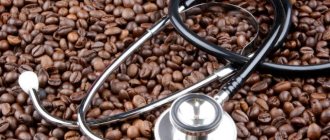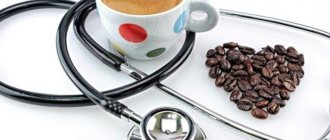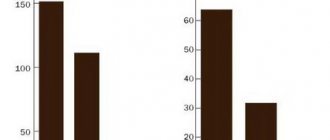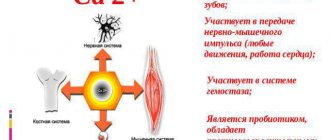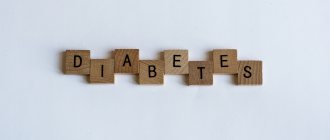The effect of coffee on heart rate
Caffeine relaxes the walls of blood vessels, which increases blood flow and improves oxygen supply to the heart. At the same time, the alkaloid acts on the adrenal glands, which begin increased production of adrenaline. For this reason, coffee increases blood pressure and increases heart rate. The processes do not occur so clearly that a healthy person can feel them. This kind of exercise even strengthens blood vessels and is good for the heart.
Tachycardia is characterized by a persistent increase in heart rate above 90 beats per minute. The unpleasant consequences of the disease are disruption of the normal supply of oxygen to the heart and the risk of developing ischemia, leading to heart attacks.
If previously cardiologists were categorically against drinking coffee for tachycardia, now the opinion of doctors is gradually changing. Numerous studies show that drinking coffee in acceptable doses does not have a negative effect on the cardiovascular system. Coffee increases the pulse slightly, but the heart rate quickly returns to normal.
Coffee with cognac – classic or dangerous?
The classic recipe for dealing with stress, consisting of a cup of coffee flavored with a large portion of cognac, is very contradictory.
Beneficial for the body separately, in tandem, coffee and alcohol, the compatibility of which is ambiguous, often become the culprits of exacerbation of heart diseases. This occurs due to the action of each of the components: cognac dilates blood vessels, causing a decrease in pressure, and caffeine narrows blood vessels and a sharp increase in pressure occurs. As a result, the body cannot “decide” how to react, with such contradictory commands from the circulatory system, and reacts with a rapid heartbeat and water imbalance.
Fans of alcoholic cocktails with coffee should adhere to precautionary , namely:
Avoid combining caffeine with alcohol at the slightest suspicion of heart disease.- If more than 2 glasses of cocktail are drunk at one time, it is necessary to restore the fluid balance in the body by taking ready-made pharmaceutical compositions to rehydrate the body and drinking plenty of fluids every hour.
- When preparing coffee drinks with alcohol yourself, you should follow the recipes exactly without increasing the doses of components. Such cocktails are fraught with a severe hangover if the volume of alcohol exceeds 30 ml, and coffee - 100 ml.
Coffee and arrhythmia
Arrhythmia is a pathological condition in which cardiac conduction, as well as the frequency and rhythm of heart contractions, are disrupted. Manifestations of the disease are interruptions in the functioning of the heart, a feeling of fading, attacks of severe tachycardia, fainting and suffocation.
Previously, with this disease, it was recommended to completely eliminate caffeine-containing drinks from the diet. But recent studies conducted by scientists from different countries have shown that the harm of coffee for arrhythmia is greatly exaggerated.
Specialists from one of the major US medical companies, Kaiser Permanente, studied the relationship between coffee consumption and the risk of developing heart rhythm disorders. The study lasted more than ten years and involved more than 130 thousand people. Statistics showed that over the entire period, arrhythmia was diagnosed in 2.5% of the experiment participants.
At the same time, disorders were also observed in people who did not drink coffee at all. In a report published in 2011 in the journal The Permanente, study leader Arthur Klatsky concluded that there is no reason to avoid drinking coffee to prevent heart rhythm problems. The scientists' findings relate only to moderate consumption of the invigorating drink in acceptable doses.
An overdose of caffeine can lead to undesirable consequences for people suffering from tachycardia and arrhythmia - overstrain of the nervous system, increased release of adrenaline, which ultimately causes a deterioration in the condition.
With and without sugar, with milk and black, in grains and instant. Espresso, latte, Americano, cappuccino... Every day, 2.25 billion cups of coffee are drunk in the world. Disputes about the benefits and harms of the aromatic drink do not subside both in the medical community and among ordinary people. What beneficial and harmful properties are not attributed to it. We'll tell you how not to get confused.
Let's look through the pharmacological reference book
The main active ingredient in coffee beans is caffeine. Its content in them varies depending on the variety, on average it is about 1%.
Let's turn to the pharmacological reference book.
Caffeine is used in medicine as a psychostimulant.
Indicated for diseases accompanied by suppression of the functions of the central nervous system and cardiovascular system (in this series, infectious diseases, drug poisoning, migraine, etc.), to increase mental and physical tone when performing responsible and urgent work, as well as for bedwetting urine.
Available in tablets of 100 and 200 mg. One cup of coffee usually contains about 100-200 mg of caffeine. Let's estimate: 1 tablet - 1 cup of coffee. The average dose of caffeine for an adult patient (for medical indications), according to the pharmacological formulary, is 50-100 mg 2-3 times a day.
Let's calculate, so to speak, the therapeutic dose of coffee: the optimal dose for an ordinary, more or less healthy person can be considered 2-3 cups of coffee per day (up to 300 mg). We’ll talk about the peculiarities of coffee consumption for specific diagnoses below.
Effect of caffeine on major body systems
One of the first to study the pharmacological effects of caffeine was the famous Russian physiologist I.P. Pavlov, the same one who studied conditioned reflexes in dogs.
- Central nervous system. Much depends on the liver
Caffeine is a psychomotor stimulant. The stimulating effect leads to increased mental and physical performance, reduced fatigue and drowsiness. But it's important to remember:
Large doses of caffeine can lead to exhaustion of the nervous system.
In addition, there is individual sensitivity to caffeine. If coffee is metabolized genetically in the liver, sensitivity to caffeine will be increased.
The implementation of the effects of caffeine is also influenced by the functional state of the liver. Attention: if it is violated, even a small dose can lead to an overdose!
- The cardiovascular system. A person with hypertension will have even higher blood pressure
Cardiac activity under the influence of caffeine increases, heart contractions become more intense, and heart rate increases. This effect is beneficial for a young heart and elastic blood vessels in reasonable doses.
But now let’s imagine: the coronary vessels are already affected by atherosclerosis, their lumen is narrowed. Intense work requires a lot of money, and the heart muscle's need for oxygen increases.
Narrowed vessels will not be able to meet the oxygen demand of the heart muscle, and ischemia will develop: angina pectoris, myocardial infarction.
See also: IHD.
Oxygen is cut off to the heart. Caffeine increases low blood pressure. At normal pressure, no significant changes occur. This is explained by the fact that caffeine has multidirectional effects on the vessels of the abdominal cavity (except the kidneys) and the vessels of skeletal muscles and other areas of the body (brain, heart, kidneys). He narrows the first, and expands the second.
See also: Arterial hypertension
What if the blood pressure is high? As a rule, a hypertensive patient already has signs of atherosclerosis and the elasticity of the wall is lost. Under such conditions, the multidirectional effects of the drug will not be neutralized. The pressure will become even higher.
Conclusion: coffee is not recommended for persons with severe arterial hypertension, angina pectoris, or previous myocardial infarction!
- Urinary system. Don't forget about a balanced diet
Caffeine increases diuresis (the production and release of urine). This is due not only to the expansion of the renal arteries, but also to a decrease in reabsorption (reabsorption) of electrolytes (Na, K, Ca, Mg ions) in the renal tubules. This leads to their elimination from the body.
A large number of articles widely discuss the issue of calcium removal from the body. Why only it, since potassium, magnesium and other electrolytes are also excreted? I hasten to calm you down. About 6 mg of calcium is lost with a cup of coffee, and about the same dose of calcium is contained in 1 teaspoon of milk. In the course of life, the body both loses and gains. This is normal metabolism.
With a rational, balanced diet, all such losses from drinking coffee can be made up.
- Digestive organs. The intestines will thank you
Caffeine has an irritating effect on the gastric mucosa and increases the secretion of gastric juice. This can lead to exacerbation of chronic gastritis, gastric bleeding with a stomach ulcer. People with chronic gastritis and stomach ulcers are not recommended to abuse coffee.
Caffeine has a beneficial effect on intestinal motility, preventing constipation.
Other important effects of caffeine (about blood clots, diabetes, tumors and heat):
- reduces tissue resistance to insulin, preventing the development of diabetes;
See also: Blood clots. Attention resort lovers!
- is an antiplatelet agent, reduces the risk of thrombosis;
- has antioxidant properties - antitumor effect;
- increases metabolism and heat production - you won’t lose much weight, but it will help you warm up.
Milk reduces and slows down. Sugar makes you heavier
See also: Break the cholesterol gene
A cup of black coffee contains about 4-7 kcal. When sugar and milk are added, its calorie content increases. One teaspoon of sugar adds another 24 kcal, 50 ml of milk - about 30 kcal. Thus, a cup of coffee with 2 tablespoons of sugar and 50 ml of milk will contain about 80 kcal.
See also: I eat what I want
You can calculate the energy value of your cup yourself. And don’t forget to include it in your overall caloric intake (if you are fighting excess weight).
By the way, milk slows down the absorption process. When you add it to coffee, you will not get a sharp high (peak) increase in caffeine in the blood, but a low, extended “plateau” over time.
If you want to reduce the effects of caffeine, drink coffee with milk.
In addition, milk reduces the irritating effect of coffee on the gastric mucosa.
Ground or instant?
Everything natural is preferable. During the production of instant coffee, the product is treated with various chemicals. And their effect on the body cannot always be predicted.
Is there an addiction to coffee? Mechanism of action of caffeine
You won’t find coffee addiction in any of the disease classifications. But many know from their own experience: as soon as you give up the usual cup of aromatic drink, lethargy, apathy, and drowsiness immediately set in. The point is the mechanism of action of caffeine.
There are adenosine receptors in the brain. The structure of the molecules of adenosine (this is a substance that causes inhibition processes) and caffeine is similar.
Adenosine causes a decrease in excitation processes in the brain. Caffeine replacing it leads to a stimulating effect. With long-term coffee consumption, new adenosine receptors are formed. An even larger dose of caffeine is required to bind all available receptors. In other words, it is possible to develop an addiction to coffee.
If you suddenly stop drinking coffee, all existing receptors will bind to adenosine. Inhibition processes will develop in the brain.
Hence lethargy, drowsiness, depression. However, within a week (after caffeine stops entering the body), the number of receptors can return to normal.
Therefore, if you want to reduce your caffeine dose and still feel good, give up coffee gradually.
Everything is good in moderation and in reasonable doses.
See also: Myocardial infarction
Even ancient healers said: “There is medicine in a spoon, poison in a cup.” If you want coffee to bring pleasure and benefit, do not abuse it. 2-3 cups a day is the dose that will help maintain vigor, efficiency and good mood.
In case of long-term severe arterial hypertension, previous myocardial infarction, or gastric ulcer, coffee is unsafe.
Main photo of the article from the site s1.1zoom.me

